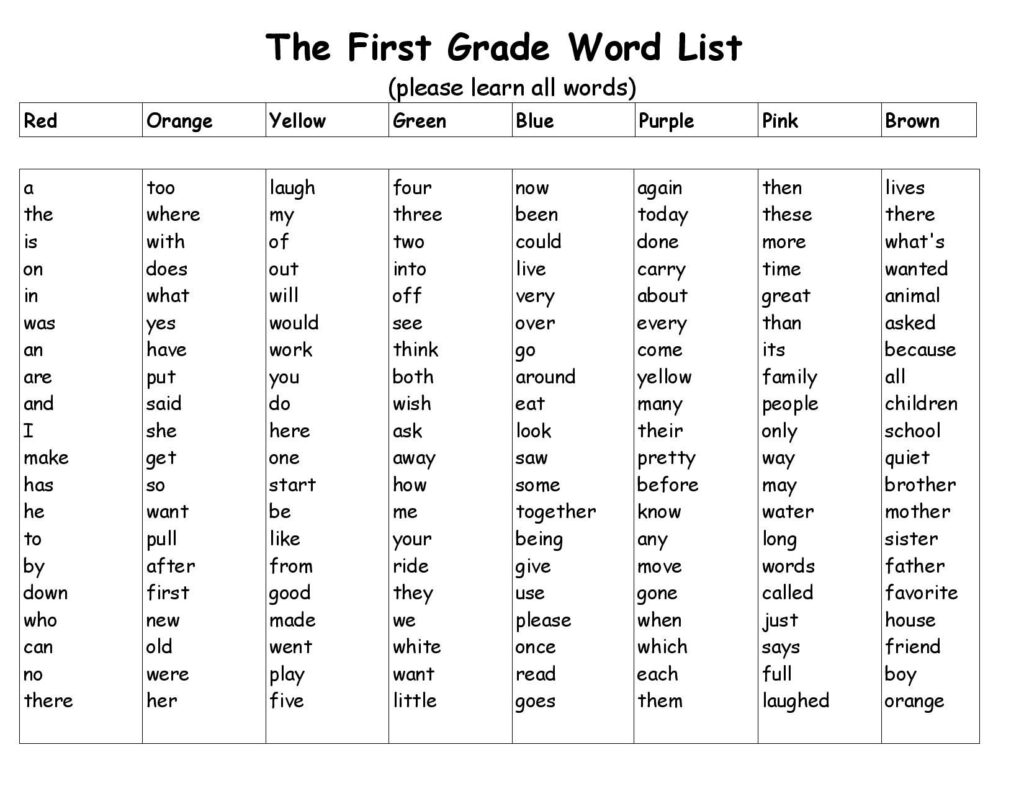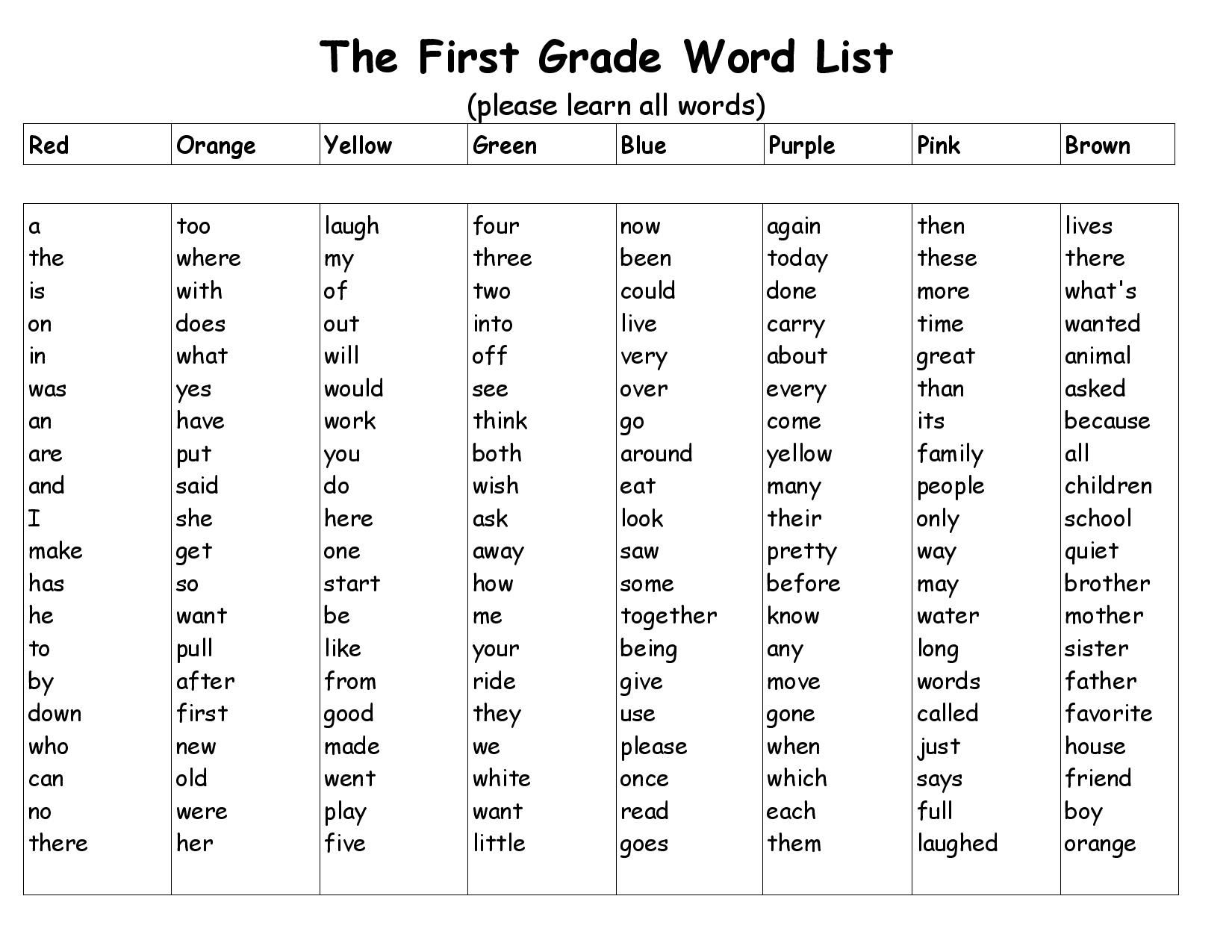
What Should First Graders Know? A Comprehensive Guide for Parents and Educators
Entering first grade is a significant milestone for children. It marks a transition from the foundational skills learned in kindergarten to more structured learning environments. Parents and educators often wonder: What should first graders know by the end of this crucial year? This guide provides a comprehensive overview of the key academic, social, and emotional skills that first graders typically develop.
Understanding these expectations can help parents support their child’s learning journey and ensure they are well-prepared for the challenges and opportunities that lie ahead. We’ll explore reading, writing, math, science, social studies, and essential social-emotional skills, providing practical tips and resources along the way.
Reading and Language Arts
Reading is a cornerstone of first-grade learning. First graders are expected to build upon their kindergarten literacy skills and become more fluent and confident readers.
Phonics and Decoding
A key focus is on phonics, the relationship between letters and sounds. First graders should be able to:
- Decode words using common phonics patterns (e.g., CVC words like cat, dog, sun).
- Recognize and read high-frequency words (sight words) automatically (e.g., the, and, a, is, are).
- Use phonics skills to sound out unfamiliar words.
Reading Comprehension
Beyond decoding, comprehension is critical. First graders should be able to:
- Retell stories in their own words, including the main characters, setting, and plot.
- Answer simple comprehension questions about a text.
- Make predictions about what might happen next in a story.
- Identify the main idea of a short text.
Reading Fluency
Fluency involves reading accurately, at a good pace, and with expression. First graders should be able to:
- Read aloud with accuracy and appropriate speed.
- Use punctuation cues to read with expression.
Writing
Writing skills also develop significantly in first grade. Students learn to express their ideas in writing and develop foundational grammar skills.
Sentence Construction
First graders should be able to:
- Write simple sentences with a subject and a predicate.
- Use correct capitalization and punctuation (periods, question marks, exclamation points).
- Use correct grammar and sentence structure.
Writing Process
First graders begin to learn the writing process:
- Brainstorm ideas before writing.
- Write a first draft.
- Revise and edit their writing with guidance.
Types of Writing
First graders explore different types of writing:
- Narrative writing (telling a story).
- Informative writing (providing facts about a topic).
- Opinion writing (expressing a viewpoint and providing reasons).
Mathematics
First grade math builds upon kindergarten concepts and introduces new mathematical ideas.
Number Sense
A strong understanding of numbers is essential. First graders should be able to:
- Count to 120, starting at any number less than 120.
- Read and write numerals to 120.
- Understand place value (tens and ones).
- Compare numbers using greater than, less than, and equal to symbols.
Addition and Subtraction
First graders develop fluency in addition and subtraction within 20.
- Solve addition and subtraction problems within 20 using various strategies (e.g., counting on, counting back, using manipulatives).
- Understand the relationship between addition and subtraction.
- Solve word problems involving addition and subtraction.
Geometry
First graders explore basic geometric shapes.
- Identify and describe two-dimensional shapes (e.g., circles, squares, triangles, rectangles).
- Identify and describe three-dimensional shapes (e.g., cubes, cones, cylinders, spheres).
- Compose new shapes from existing shapes.
Measurement
First graders learn basic measurement concepts.
- Measure length using non-standard units (e.g., paper clips, cubes).
- Tell time to the hour and half-hour using analog and digital clocks.
Science
First grade science introduces students to the natural world and scientific inquiry.
Life Science
Topics often include:
- The needs of living things (e.g., food, water, shelter).
- Plant and animal life cycles.
- Basic understanding of habitats.
Physical Science
Topics often include:
- Properties of matter (e.g., solid, liquid, gas).
- Simple machines (e.g., levers, pulleys).
Earth Science
Topics often include:
- Weather patterns.
- The Earth’s resources (e.g., water, soil).
Social Studies
First grade social studies introduces students to concepts of community, citizenship, and history.
Community
Topics often include:
- Roles and responsibilities of community members.
- Different types of communities (e.g., urban, suburban, rural).
Citizenship
Topics often include:
- Rules and laws.
- Patriotism and national symbols.
History
Topics often include:
- Important historical figures and events.
- The concept of time and change.
Social and Emotional Skills
Beyond academics, social and emotional skills are crucial for success in first grade and beyond. What should first graders know about interacting with others and managing their emotions?
Self-Awareness
Understanding one’s own emotions and how they affect behavior.
Self-Management
Managing emotions and behaviors effectively.
Social Awareness
Understanding the perspectives of others and showing empathy.
Relationship Skills
Building and maintaining healthy relationships.
Responsible Decision-Making
Making ethical and constructive choices.
Practical Tips for Parents
Parents play a vital role in supporting their child’s learning in first grade. Here are some practical tips:
- Read with your child every day.
- Help your child with homework assignments.
- Communicate regularly with your child’s teacher.
- Provide opportunities for your child to practice their skills.
- Encourage your child’s curiosity and exploration.
Addressing Learning Gaps
It’s important to recognize that children develop at different rates. If you’re concerned that your child is falling behind, talk to their teacher. Early intervention can help address any learning gaps and ensure your child stays on track. Understanding what should first graders know is only the first step; supporting their individual needs is equally crucial.
What should first graders know is a question many parents ponder. By understanding the academic, social, and emotional expectations for first grade, parents and educators can work together to support children’s growth and development. Remember that every child learns at their own pace, and with the right support, all children can succeed. It’s important to foster a love of learning and create a positive and encouraging learning environment.
By focusing on these key areas and providing consistent support, you can help your first grader thrive and build a strong foundation for future academic success. Knowing what should first graders know empowers you to be an active participant in their educational journey.
Ultimately, the goal is to nurture well-rounded individuals who are confident, curious, and prepared for the challenges and opportunities that lie ahead. The journey through first grade is a significant step in this process. Remember to celebrate their successes and support them through any challenges they may face. Understanding exactly what should first graders know will make the experience more rewarding for both the child and the adult.
Consider exploring additional resources to supplement your child’s learning. Libraries, educational websites, and learning apps can all provide valuable support. Remember that learning extends beyond the classroom and into everyday life. Encourage your child to ask questions, explore their interests, and engage with the world around them. As they master what should first graders know, they’ll gain confidence and a love for learning that will last a lifetime.
Helping them understand what should first graders know and facilitating their learning journey is a partnership. Working together, parents and educators can create a supportive environment where every child can reach their full potential. The key is to be informed, proactive, and responsive to the individual needs of each child. Knowing what should first graders know is a powerful tool in this collaborative effort.
This comprehensive guide has outlined the key areas of focus for first-grade education. By understanding these expectations, parents and educators can work together to create a supportive and enriching learning environment for all children. The question of what should first graders know is answered through a multifaceted approach, encompassing academics, social-emotional development, and a commitment to fostering a lifelong love of learning. [See also: Reading Comprehension Strategies for Elementary Students] [See also: Math Games for First Graders] [See also: Social Emotional Learning Activities for Kids]

